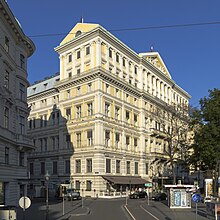Bulgarian national government-in-exile Българско национално правителство в изгнание | |||||||||
|---|---|---|---|---|---|---|---|---|---|
| 1944–1945 | |||||||||
|
Flag | |||||||||
| Status | Government-in-exile | ||||||||
| Capital | None | ||||||||
| Capital-in-exile | Vienna | ||||||||
| Common languages | Bulgarian | ||||||||
| Prime Minister | |||||||||
• 1944—1945 | Aleksandar Tsankov | ||||||||
| History | |||||||||
• Established | 16 September 1944 | ||||||||
• Disestablished | 10 May 1945 | ||||||||
| |||||||||

The Bulgarian National Government-in-exile (Bulgarian: Българско национално правителство в изгнание, Balgarsko natsionalno pravitelstvo v izgnanie) was a right-wing Bulgarian government-in-exile after the monarchist government of Bulgaria was deposed in a communist backed coup d'état on September 9, 1944, and was replaced by the communist Fatherland Front, which later formed the People's Republic of Bulgaria. The Bulgarian government in exile had very little support among Bulgarians and commanded Bulgarian troops loyal to the Germans. It was dissolved in May 1945, and its prime minister, the Bulgarian nationalist Aleksandar Tsankov, fled to Argentina.
